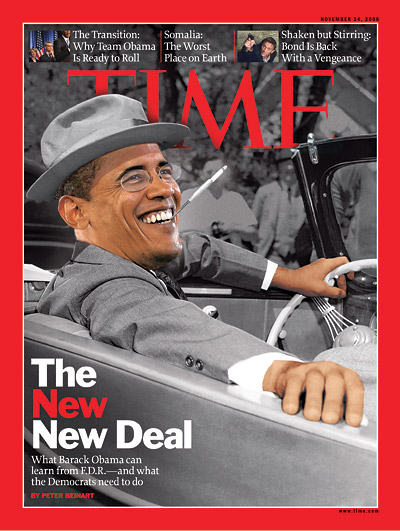Is $1,200,000,000,000.00.  That's the expected 2009 Federal budget deficit.  Since the current Federal debt is estimated at a "mere" $10.6 trillion, this means that we're expected to add nearly 9% in a single year to a debt accumulated over 233 years (since 1774).  This number also amounts to more than 8% of the U.S. economy.Â
So what does this have to do with technology policy?  To start with, this figure comes from Congressional Budget Office estimates, which "don't account for the huge economic stimulus bill Obama is expected to propose soon to try to jolt the economy."  So, while the Obama team has talked about big "public works" and "infrastructure" spending (which used to be called, variously, "make-work," "pork barrel" and "corporate welfare"), there's sure to be huge pressure not to wastemore taxpayer money on top of this staggering figure.  Whatever blame Bush deserves, Obama probably doesn't want to go down in history as the man who finally caused the U.S. government to default on its unmanageable debt burden.
One certainly could make an argument that the kind of technology-related "infrastructure" stimulus Obama has talked about (e.g., broadband subsidies) would be less of a waste of money than, say, simply building more bridges (as Japan did in the 1990s, its "lost decade") or other reflexively Keynesian responses.  But even so, I suspect that the total amount of funding made available for such projects won't be anywhere near enough to satisfy the technology policy Left. Â
This could result in increased pressure on the Administration to increase regulation of the technology sector in order to implement tech-leftist ideas about "protecting" users' privacy, promoting media diversity or "fairness", mandating net "neutrality," "opening up" spectrum, etc.  Such  proposals might seem attractive precisely because they generally wouldn't require increased Federal expenditures other than the cost of hiring more bureaucrats (which means more government employee union jobs anyway--hardly a bad thing for Democrats)--while the economic consequences of such proposals for companies and consumers will probably surely be trivialized.  For example, if the advocates of government control at the so-called "Free Press" can't get universal broadband, they'll probably press that much harder to cripple online advertising and traffic management by ISPs, just to name two popular bogeymen.
One might think that a sharp economic decline would cause policy-makers to think twice before undermining the business models that have supported IT innovation andreal infrastructure investment.  But one has only to look at the policies of FDR's first two terms to see how even an amiable, soft-spoken president elected on a mantra of change and "uniting" the nation in a time of crisis could consistently choose to place "Reform" (i.e., increased regulation) over "Recovery" (i.e., the health of the economy)--with devastating economic consequences.
Even if Obama isn't a fanatic about the ideals of the technology policy Left, it remains to be seen whether he will be able to resist the ideological agenda of Congressional Democrats on technology policy. I suppose the first indication we'll have as to whether the Administration will chart a more reasonable course will be whom he appoints to head the FTC and FCC and as CTO. Since the first two appointments are to independent agencies, Obama will have to choose someone who appreciates how much damage the "Reform" agenda could do--lest he find, as Bush has with the phony-free-marketeer Kevin Martin, that his Chairmen are fair more radical regulators than he is. Obama's appointment of Cass Sunstein as head of the Office of Information and Regulatory Affairs is hardly encouraging, for the reasons Adam has noted.
We may also find that the Administration has better things to do than worry about Internet, communications or media policy--and is therefore all too willing to defer to their appointees (as Bush did with Martin). If that happens, all Obama's lofty talk of non-partisanship won't make any difference if his appointees start taking their marching orders from the hardcore advocates of "Reform."